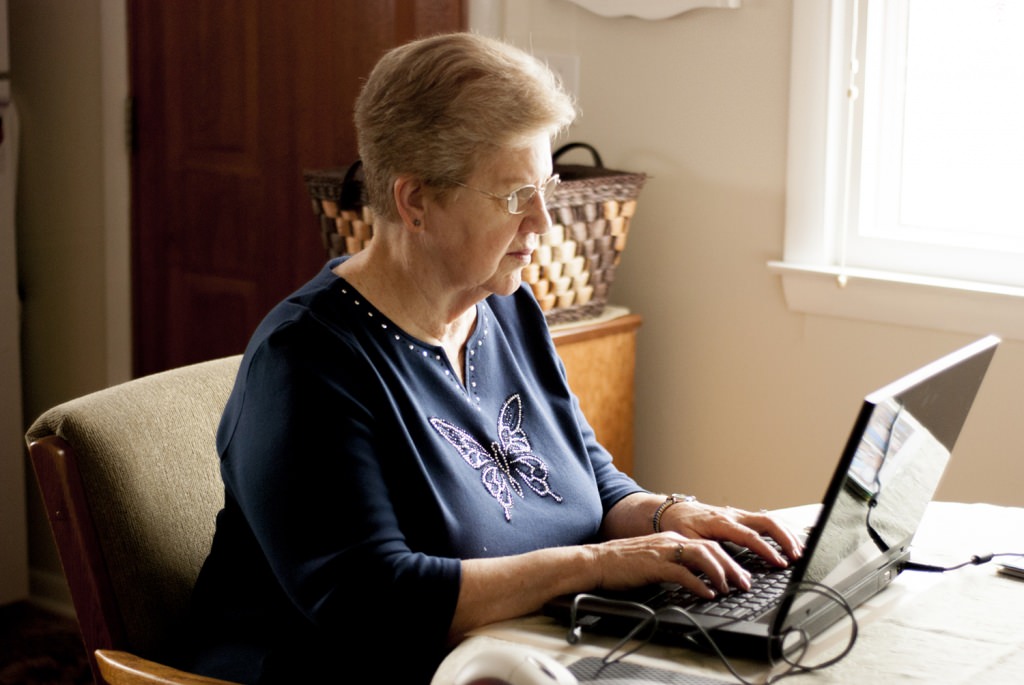Online support may help older adults deal with chronic conditions

An electronic health support system may help older adults manage multiple chronic health conditions by motivating them, connecting them with support groups and helping them cope with symptoms. Photo: David Gustafson
Nearly two-thirds of Medicare patients are being treated for at least three chronic health problems, and almost one-quarter have five or more chronic conditions. Their care accounts for a stunning 90 percent of Medicare spending.
University of Wisconsin–Madison engineers and doctors believe those patients would be happier and healthier — and easier on Medicare’s balance sheet — if they could actively contribute to managing their symptoms in partnership with medical care providers. The National Institutes of Health (NIH) has invested $4.2 million in the idea through a new grant to UW–Madison’s Center for Health Enhancement Systems Studies (CHESS), directed by Professor Emeritus of Industrial and Systems Engineering David Gustafson.
“We will develop a new e-health intervention called Chronic Condition Health Enhancement Support System, or C-CHESS,” Gustafson says. “It builds upon the success of our previous CHESS applications for conditions like cancer, asthma and alcoholism, which have been proven in 15 randomized clinical trials. Using the same gold standard, we will evaluate the benefit of adding C-CHESS to ‘treatment as usual’ for multiple chronic conditions.”
In collaboration with Randall Brown, a UW–Madison professor of family medicine and community health, Gustafson will recruit 330 older adults diagnosed with at least three of four conditions: hypertension, hyperlipidemia, diabetes and osteoarthritis.
Half the participants will use the C-CHESS electronic health system. The rest will be instructed to review websites related to their conditions. Everyone will get their usual medical care, but the C-CHESS users will have access to a system designed to boost their motivation and ability to cope with illness through web-based support and social networks of patients with similar health conditions.
C-CHESS continues a collaboration between Gustafson and Jane Mahoney, a UW–Madison professor of geriatrics, on the Elder Tree system.
Elder Tree, which is now available free in 53 of Wisconsin’s 72 counties, helps older adults decrease the risk of falls, and reduce loneliness and isolation. Unexpectedly, Elder Tree users have reported a dramatic reduction in their medical symptoms and physician visits, motivating the research team to implement a direct link to health care providers in C-CHESS.
“When a user’s self-reported data indicate a worrisome change in their health status, the online system informs the clinical team and provides an up-to-date summary of the patient’s symptoms over time,” Gustafson explains.
By connecting older adults with their primary care providers, the researchers expect C-CHESS will facilitate shared goal setting, health tracking and symptom communication, ultimately improving health.
An electronic health support system may help older adults manage multiple chronic health conditions by motivating them, connecting them with support groups and helping them cope with symptoms.
The grant from NIH’s National Heart, Lung, and Blood Institute also continues a collaboration with Marie-Louise Mares, UW–Madison professor of communication arts, who brings to the project experience designing technology for children and older adults.
The A-CHESS support system for alcohol use disorder is being used by more than 6,000 patients in the United States, New Zealand and Australia, with that number expected to increase to 10,000 by the end of 2017, Gustafson says. It is one of 11 finalists for the Harvard Kennedy School’s 2016 Innovations in American Government Award.
Gustafson hopes C-CHESS will achieve similar success.
“To control health care costs, we expect to see a continued decrease in inpatient and increase in outpatient service use, which means we have to find a way to support patients during the high-risk times right before and after they receive medical care,” Gustafson says. “I think that’s where our technology can make a significant difference.”
Tags: engineering, health care




